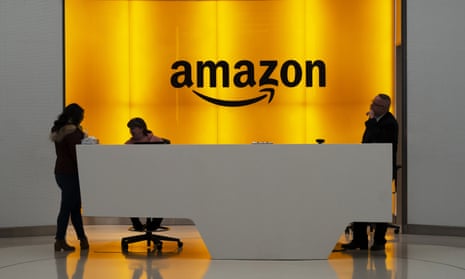This week, Amazon abandoned a plan to open a second “headquarters” in New York City, after citizens rebelled against the idea of paying almost $3bn in subsidies and tax incentives to one of the world’s biggest corporations. But simply saying “no” to Amazon’s coercive terms is not enough. New York citizens should now demand that the state’s Attorney General Tish James begin investigating the corporation for abusing its power as a monopoly.
One reason the idea of subsidizing Amazon with New York city and state tax monies was so galling is that the corporation is already extracting so much wealth from the region. Amazon for more than a decade has steadily battered the American book publishing industry, which is largely based in New York, and which employs tens of thousands of residents. The corporation has done so through thuggish negotiating tactics, including simply refusing to sell a publisher’s inventory unless they agreed to a detailed list of concessions.
Similarly, Amazon a few years ago used age-old predatory pricing tactics to essentially bankrupt Diapers.com, a business located in Jersey City, by underpricing its rivals. In the end Diapers.com sold itself to Amazon, which shut the operation down.
It’s not just New Yorkers who are suffering from Amazon’s abuse of its monopoly control over many of America’s most high-profile markets. Amazon’s current business model is a threat to anyone who wants to make or sell things in America. Take the case of the small company, Fuse Chicken, one of the hundreds of thousands of enterprises that must sell their wares and services through Amazon, due to that corporation’s dominance of online commerce.
In this case the founder of Fuse Chicken, who had left his day job to design high-quality phone charging accessories, discovered that Amazon was helping Chinese counterfeiters to sell knock-off versions of his product under the Fuse Chicken brand name. This is not uncommon; even large companies like Birkenstock and Nike have reported big problems with counterfeits on Amazon’s marketplace. In the case of Birkenstock, Amazon refused to stop counterfeiting unless the shoe maker agreed to sell its whole catalogue through Amazon. That sounds less like legitimate business tactics and more like mob extortion.
As legal scholar Lina Khan has observed, Amazon’s business model is predicated upon a suite of anti-competitive coercive tactics in which it exploits its power over the core infrastructure of commerce. The attempt to extort New York City was just the latest episode.
The initial decision by Amazon to locate in New York was part of a Hunger-Games-style bidding contest in which the corporation asked for concessions and proposals from cities across North America for a supposed second headquarters.
Amazon’s retreat was a setback for a host of politicians, none more so than Governor Andrew Cuomo of New York. Cuomo, who jokingly offered to change his name to Amazon Cuomo, lashed out at critics of the deal, attacking elected leaders who “put their own narrow political interests above their community”.
Since the news that Amazon was pulling out, Governor Cuomo has led the attacks on the citizens who opposed his backroom deal with Amazon. But let’s be clear. New York didn’t say no to Amazon. What New York said no to was Amazon’s outrageous terms, which were reached through a secret process with no input from the communities that will be most affected. The leader of the opposition to these terms, state Senator Mike Gianaris, actually argued that there were ways Amazon could make this deal work. And even without this deal, Amazon is hiring and expanding in New York.

The pushback came from community activists, as well as courageous politicians like state Senators Michael Gianaris, Andrea Stewart-Cousins, Jessica Ramos, and councilmen Corey Johnson and Jimmy Van Bremer. But the opposition to the deal did not only come from individual citizens, politicians, and grassroots groups. The former mayor Michael Bloomberg also attacked the Cuomo-DeBlasio deal as a naïve giveaway, as did existing businesses in the city who opposed the unfair subsidies.
It’s easy to see why the deal is a bad idea on its own merits. These kinds of subsidies generally don’t work as advertised; on average, only a quarter of the jobs promised by such bribes end up going to local residents who would otherwise be unemployed. If Governor Cuomo and Mayor DeBlasio want to invest $3bn in New York, they’d get a much bigger bang for their citizens’ bucks if they used it to create three times as many jobs in housing or transportation. And if they want to help New York business, they would stand up to predatory monopolies like Amazon, or deal with excessive rents from real estate interests.
It’s not only the citizens of New York who are waking up to the need to deal with Amazon’s abuse of its monopoly middleman position. In India, the government recently banned the corporation from selling its own products in direct competition with the products of other companies. Across Europe, antitrust enforcers in Brussels and in a growing number of countries have launched investigations of the corporation.
The time has come for America’s antitrust enforcers to join in the task of bringing Amazon to heel. The reason Amazon was able to grow so huge, and act so badly, is that for a generation now, America’s antitrust law enforcers have refused to enforce the law. One person who can begin to correct that problem is New York’s own new attorney general, Tish James. This week New Yorkers saw they could chase a bully away from their treasury. Now they should demand that their government punish Amazon for the gangster-like business tactics the corporation has used to pillage New York businesses.
Matt Stoller is fellow at the Open Markets Institute, where he is researching the history of the relationship between concentrated financial power and the Democratic party in the 20th century
